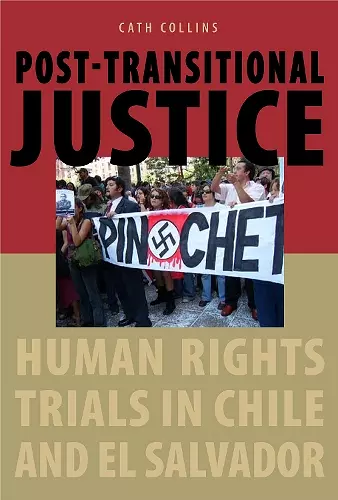Post-transitional Justice
Human Rights Trials in Chile and El Salvador
Format:Hardback
Publisher:Pennsylvania State University Press
Published:30th Jul '10
Currently unavailable, and unfortunately no date known when it will be back
This hardback is available in another edition too:
- Paperback£29.95(9780271036885)

Latin America is still dealing with the legacy of terror and torture from its authoritarian past. In the years after the restoration of democratic governments in countries where violations of human rights were most rampant, the efforts to hold former government officials accountable were mainly conducted at the level of the state, through publicly appointed truth commissions and other such devices. This stage of “transitional justice” has been carefully and exhaustively studied. But as this first wave of efforts died down, with many still left unsatisfied that justice had been rendered, a new approach began to take over. In Post-transitional Justice, Cath Collins examines the distinctive nature of this approach, which combines evolving legal strategies by private actors with changes in domestic judicial systems. Collins presents both a theoretical framework and a finely detailed investigation of how this has played out in two countries, Chile and El Salvador. Drawing on more than three hundred interviews, Collins analyzes the reasons why the process achieved relative success in Chile but did not in El Salvador.
“This book is indispensable for understanding how Latin America evolved from a region of dictatorships, gross human rights violations, and rampant impunity to one defined by greater accountability and the rule of law. Collins goes beyond analyzing the transitional justice models of the 1980s and provides a comprehensive overview of the actors, strategies, and institutions that led to the emergence of ‘post-transitional accountability trajectories.’ Collins’s framework will undoubtedly be useful to study and advise other countries that are undergoing similar transitions.”
—José Miguel Vivanco, Human Rights Watch
“Cath Collins has written a meticulous and balanced study of the internal and external factors that lead to changes in the judiciary's attitude toward prosecuting human rights–related crimes, especially those of the powerful. . . . Collins looks carefully and deeply at the trends within Chile that opened up space for investigations and eventually prosecutions of military officers. She makes room for external factors like Pinochet's arrest in London, but argues that external seeds will only effectively advance a justice agenda if they fall in fertile domestic soil. She uses El Salvador, where an anti-impunity agenda has not advanced, to prove her point. Altogether a fascinating read and a well-argued perspective that enriches the debates around transformational justice in Latin America.”
—Naomi Roht-Arriaza, University of California, Hastings College of the Law
“Cath Collins provides an in-depth study of the struggle to obtain justice for human rights violations in two countries that have adopted very different strategies, both during conflicts and after transition. The comparison demonstrates the importance of domestic efforts, carried out by local actors, in advancing the cause of justice. By analyzing the efforts made in both countries over a substantial period of time, Collins provides evidence not only of the difficulties faced in obtaining justice for past violations committed by regimes that retain power and influence after they leave office, but also of the ways in which many of those obstacles can eventually be overcome. This book is a significant contribution toward understanding these struggles in El Salvador and Chile, but it also provides important lessons applicable to other countries facing similar challenges.”
—Cristián Correa, Senior Associate, International Center for Transitional Justice (ICTJ)
“This is a well-written, thoughtful study that advances our understanding of human rights and comparative politics. It draws ably on newer literature on the ‘justice cascade’ and the importance of judicial autonomy and jurisprudence. . . . Post-transitional Justice is an able analysis of two important struggles for justice that introduces a stimulating and useful new model of the forces that facilitate the rule of law.”
—Alison Brysk Journal of Latin American Studies
“This book should be required reading for scholars interested in the transitional justice debate.”
—Amy Risley Bulletin of Latin American Research
ISBN: 9780271036878
Dimensions: 229mm x 152mm x 27mm
Weight: 567g
296 pages